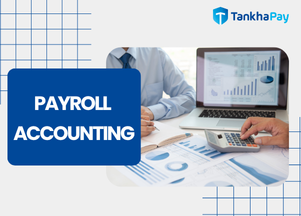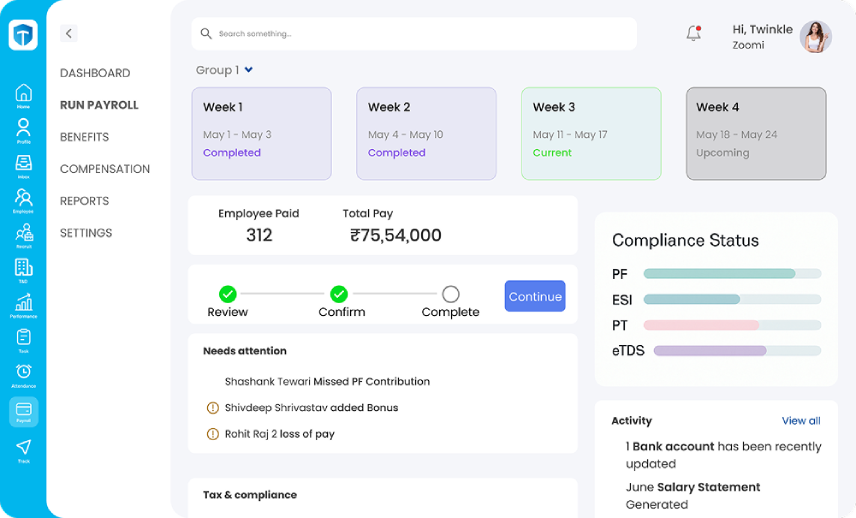
Introduction: The Evolution of Payroll Accounting
Over the years, payroll accounting has evolved from simple paper-based record-keeping to fully automated digital systems powered by artificial intelligence (AI) and cloud technology. What once required manual effort, complex calculations, and hours of paperwork can now be managed in minutes with modern payroll accounting software.
In 2026, businesses in India are entering a new era of payroll automation — one that emphasizes compliance, transparency, and data-driven insights. Whether you are a small startup or a large enterprise, payroll accounting has become a vital part of your financial health and employee satisfaction strategy.
What Is Payroll Accounting and Why It Matters in 2026
Payroll accounting refers to the process of recording, managing, and analyzing all financial aspects related to employee compensation — including salaries, bonuses, deductions, benefits, and taxes. It ensures that every employee is paid accurately and on time while maintaining compliance with statutory laws.
In 2026, payroll accounting has grown beyond traditional bookkeeping. It now involves:
- Automation of recurring salary processes
- Integration with HR, finance, and compliance systems
- Use of AI for smart tax calculations and audits
- Real-time visibility into payroll expenses and workforce costs
Accurate payroll accounting is essential because it directly impacts:
- Employee trust and satisfaction – Timely and correct salary payments foster a motivated workforce.
- Compliance with Indian labour laws – Ensures businesses avoid penalties and maintain legal integrity.
- Financial transparency – Provides accurate data for audits and budgeting.
- Strategic decision-making – Payroll data helps organizations make informed HR and finance decisions.
The Growing Role of Automation in Payroll Accounting

One of the biggest shifts in payroll accounting in 2026 is automation. Manual payroll management is no longer feasible for growing businesses due to its time-consuming and error-prone nature.
Automation in payroll accounting means using software to:
- Calculate salaries, deductions, and reimbursements automatically
- Generate payslips and tax forms in seconds
- Process payroll cycles without manual intervention
- Track attendance and leave for accurate salary disbursals
Benefits of payroll automation:
✅ Reduced human error
✅ Faster processing time
✅ Enhanced accuracy and compliance
✅ Real-time updates and reporting
With automation, HR and finance teams can now focus on strategy and employee engagement rather than repetitive data entry.
AI-Powered Payroll Compliance in 2026
Artificial Intelligence (AI) has become a game-changer for payroll compliance. In 2026, AI-driven payroll systems in India can automatically detect irregularities, predict compliance risks, and ensure adherence to tax regulations and labour laws.
How AI Enhances Payroll Accounting Compliance:
- Smart anomaly detection: AI can identify salary discrepancies or incorrect deductions before payroll release.
- Automated statutory updates: Payroll software automatically updates itself when government laws or tax slabs change.
- Predictive compliance: AI tools forecast potential compliance risks based on employee data patterns.
- Error-free filings: Automated e-filing of PF, ESI, TDS, and other compliance forms.
By integrating AI into payroll systems, businesses ensure accuracy, reduce the risk of fines, and maintain complete transparency in employee payments.
Integration of Payroll Accounting with HR & Finance Systems
In 2026, integrated payroll systems are no longer optional — they’re essential. Payroll accounting now connects directly with HR, finance, and ERP software, ensuring data consistency and efficiency across departments.
Benefits of Integrated Payroll Systems:
- Centralized Data Management: A single platform for employee details, attendance, and payroll.
- Accurate Financial Reporting: Syncs payroll data with accounting ledgers for easy audits.
- Streamlined HR Processes: HR teams can manage onboarding, attendance, and appraisals with seamless payroll integration.
- Real-Time Decision Making: Businesses can track salary expenses, cost per employee, and productivity insights instantly.
With cloud-based integrations, data flows smoothly between HR and finance departments — enhancing accuracy and reducing duplication of work.
Key Payroll Accounting Trends Shaping 2026
The payroll landscape in India is rapidly evolving, and 2026 is set to redefine how businesses manage salary accounting.
Here are the top payroll accounting trends shaping the year:
- Cloud-Based Payroll Accounting: Remote accessibility, scalability, and data backup are driving the cloud payroll revolution.
- AI & Machine Learning Integration: Predictive analytics for smarter payroll decisions.
- Mobile Payroll Applications: Employees can check payslips, leave balances, and tax info from mobile devices.
- Real-Time Payroll Analytics: Data visualization tools for accurate workforce cost analysis.
- Employee Self-Service Portals: Empowering employees to manage their payroll data independently.
- Enhanced Cybersecurity: Data encryption and secure servers for payroll confidentiality.
- Eco-Friendly Digital Payroll: Paperless salary statements and automated reporting.
These trends highlight the shift toward smarter, faster, and more transparent payroll systems — powered by automation and data intelligence.
Challenges Businesses Face in Modern Payroll Accounting
Even with advanced technology, payroll accounting comes with challenges that businesses must address to stay efficient and compliant.
Common Payroll Accounting Challenges:
- Constant Regulatory Changes: Frequent updates in taxation and compliance laws.
- Data Security Risks: Protection of sensitive employee information from breaches.
- Manual Errors in Input: Even small data entry mistakes can lead to salary discrepancies.
- Integration Gaps: Legacy systems that don’t sync with modern payroll tools.
- Scalability Issues: Growing teams need scalable payroll systems that can handle large data volumes.
Solution:
Businesses should adopt AI-enabled, cloud-based payroll accounting software that offers automated updates, built-in compliance checks, and advanced data protection features.
Best Payroll Accounting Software & Tools for 2026
To stay competitive, businesses in India must choose reliable and efficient payroll accounting software that caters to automation, compliance, and scalability needs.
Here are some of the best payroll software options in India for 2026:
- TankhaPay – An all-in-one payroll management and compliance solution for seamless salary processing.
- Keka Payroll – Known for automation, HR integration, and employee self-service.
- Zoho Payroll – Ideal for SMEs, offering easy compliance tracking and payslip generation.
- GreytHR – Offers robust automation and integration for HR and finance teams.
- RazorpayX Payroll – Simplifies payments, taxes, and compliance filings for startups and enterprises.
- HRMantra – Best for large organizations requiring detailed payroll analytics.
- SumHR – Cloud-based, user-friendly software for small businesses.
Features to Look for in 2026:
- Automated compliance management
- Real-time analytics and dashboards
- Cloud accessibility
- Data encryption and multi-layered security
- Mobile app access for HR and employees
Choosing the right software ensures not just smooth payroll management but also future-readiness.
The Future of Payroll Accounting: Predictive Insights & Smart Reporting
In 2026 and beyond, payroll accounting will continue to evolve into a data-driven strategic function. Predictive analytics and smart reporting will empower HR and finance teams to make more informed business decisions.
Future-Driven Features to Expect:
- Predictive Payroll Analysis: AI will forecast salary expenses and workforce trends.
- Smart Dashboards: Visual payroll data for real-time business insights.
- Blockchain Integration: Secure, transparent record-keeping for payroll data.
- Voice-Activated Payroll Queries: AI assistants handling payroll queries instantly.
Payroll accounting will become not just a compliance necessity but a strategic business tool — providing insights that drive growth and profitability.
Conclusion: Adapting to the AI-Driven Payroll Era
The year 2026 marks a turning point for payroll accounting in India. Businesses that embrace AI-powered payroll systems, automation, and data analytics will lead the way in efficiency, compliance, and employee trust.
By integrating HR and finance, adopting cloud solutions, and leveraging AI compliance, companies can transform payroll from a back-office task into a powerful decision-making system.
As digital transformation accelerates, payroll accounting will no longer be about just paying salaries — it will be about empowering businesses with intelligence, compliance, and innovation.


